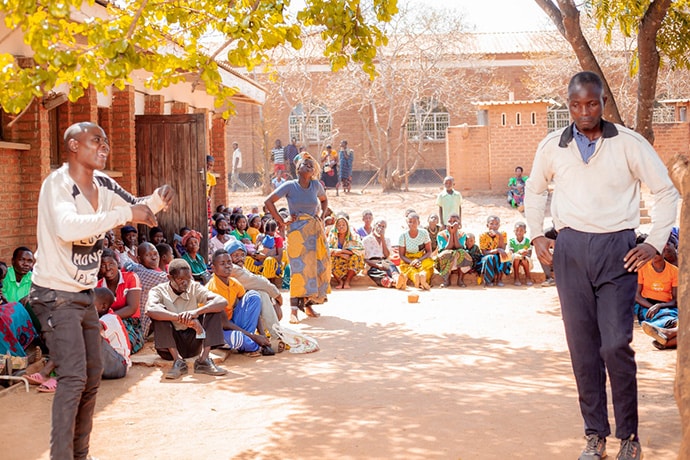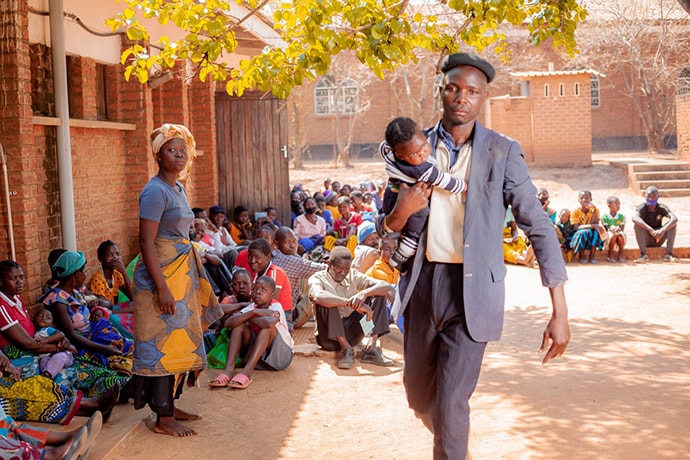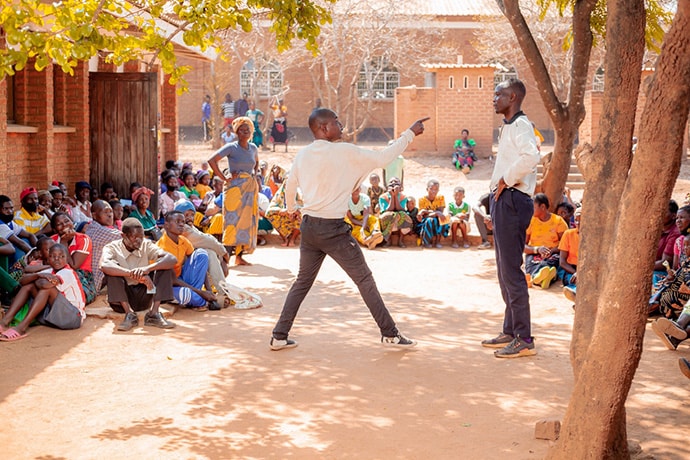By Joan Kalepa and Ronald Ngeno, VillageReach

Drama group acting in a play called “Better Late than Never” in Malawi. Photo credit: Cosmah Chaula
Imagine a child’s missed vaccination sparking a dramatic scene, not of anger, but of awareness. In Malawi, this is a powerful new approach to public health. Through theatrical performances on local stages, communities are learning about the importance of vaccinations in a way that’s both entertaining and effective.
The Let’s Talk About Vaccines! project, a collaboration between VillageReach and the Malawi Ministry of Health, aims to achieve three main objectives: increased knowledge about immunization, higher vaccination rates and greater participation of men and all family members in the process.
One way it is tackling vaccine hesitancy and low immunization rates is through the power of edutainment – a blend of education and entertainment. By employing drama, the project engages communities, dispels myths and empowers families to prioritize their children’s health.
The project, focused on addressing under immunization among children under two in Lilongwe and Mzimba districts, utilizes a community-based participatory research (CBPR) approach. This method uncovers barriers to full immunization and devises scalable solutions in collaboration with the community and health workers.
The Let’s Talk About Vaccines! project implements various strategies to help children get the vital vaccinations they need to stay healthy, including mobilizing the community through drama, improving the immunization service experience via talking books and involving the community in tracking progress for continuous improvement.

A man walks away with his child in the play, “Better Late Than Never” in Malawi. Photo credit: Cosmah Chaula
Community Mobilization through Drama
Recognizing the power of storytelling and its ability to resonate within communities, the Let’s Talk about Vaccines! project turned to drama to effectively communicate key messages about immunization. Drama has long been a popular and accessible form of communication in Malawi, which has a rich tradition of storytelling and performance. Leveraging this existing cultural tradition, the project sought to harness the power of drama to engage communities and address vaccine hesitancy.
Eight drama groups, one from each health facility, were enlisted to craft four unique scripts each and deliver performances throughout the year to engage and educate audiences. A three-day training session equipped the drama groups with the project’s objectives, key messages and basic acting skills.
The scripts focused on addressing the key reasons children missed vaccinations, as identified in our community-based research. They spread messages on the importance of vaccines, the type needed, vaccine schedule, their documented safety as well as potential side effects. The groups also addressed common vaccine rumors and sought to increase the involvement of men and other family members in the immunization of children.

An actor is speaking about the importance of immunization in the play, “Better Late Than Never” in Malawi. Photo credit: Cosmart Pictures
A Collaborative Effort for a Healthier Future
From script development to training local actors, the Let’s Talk about Vaccines! project is a shining example of how creative communication strategies can overcome gaps in knowledge and inspire positive behavior change. By harnessing storytelling and community engagement, this initiative is making a significant impact on public health in Malawi and as of March 2024 over 8,269 people had attended the plays, since October 2023. Its success highlights the potential of edutainment to address vaccine hesitancy and promote better health outcomes for children around the world.
To learn more about the work VillageReach does, dive into our 2023 Annual Impact Report and discover the stories of our collective achievements.